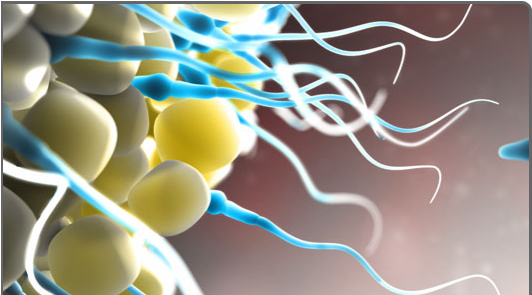Waist circumference was inversely associated with both semen volume and sperm count. Obese men were 19 times more likely to have low total sperm counts and 15 times more likely to have low semen volumes.
Tag: semen
Freezing Sperm Taken Directly from Testicles is Effective Option for Infertile Couples
Frozen sperm taken by biopsy from testicles in men with no sperm in their semen is as effective as fresh sperm taken by biopsy in helping couples conceive through in vitro fertilization (IVF), according to a study at Washington University School of Medicine in St. Louis.
Infertility in Men Caused by In Utero Factors?
A recent study suggests that several in utero factors may cause infertility in men because it affects the reproductive system characterized by semen parameters like reduced sperm count and decreased sperm motility.
For Men, Infertility Often Becomes a Private Heartache
That’s what the good people inside the building call it: a sample. They never call it “sperm” or “semen.” And they don’t call it “your dream of having a family,” though everyone knows that’s what it is.
Is There an Age Limit to Male Fertility?
The world’s oldest new dad, who, at the reported age of 96, just fathered a baby boy in India, says he’s done having kids. But if he wanted to break his record again in a couple years, would biology allow it?
Though sperm production does usually keep up until a man’s dying day, it’s a misconception that “biological clocks” are only of concern to women.
The effects of aging on fertility have been studied far less in men than in women, but research shows that both volume and quality of semen generally fall off as a man gets older.
A 2004 study published in the American Journal of Obstetrics and Gynecology found that, among a sample of couples using in vitro fertilization, every additional year of a man’s age corresponded to an 11-percent increase in the odds that a couple would not achieve a pregnancy. Read full article.
Semen Protein Acts as a Master Regulator for Females
Working with fruit-flies (Drosophila melanogaster), University of East Anglia scientists have observed “remarkable” changes in female gene expression after exposure to a protein in semen. The researchers say the effects, which may also exist in other species, include altered fertility, immunity, libido, eating and sleep patterns. Published in the journalProceedings of the Royal Society B, the new findings add to the growing list of intriguing physiological effects triggered by exposure to semen. Read full article.
